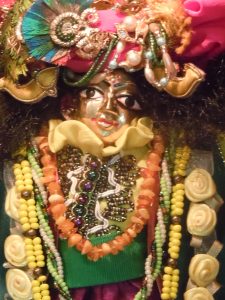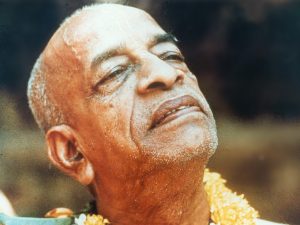Hare Krsna-below we have a few descriptions from The Srimad Bhagavatam, Bhagavad Gita and lectures, of the actual characteristics of a mukta purusa, or liberated person-and only this type of person is liberated from the material energy, known as maya. As you can see, these qualifications are enormous and only a fraction of the qualities of a pure devotee of the Lord. When someone presents himself as a mukta purusa, we should know and test to see if he has these qualities-otherwise as we all know it is Kali yuga, the age of hyprocrisy.
damaghosa das
—————————————
SB 6.4.26 Translation-When one’s consciousness is completely purified of the contamination of material existence, gross and subtle, without being agitated as in the working and dreaming states, and when the mind is not dissolved as in suṣupti, deep sleep, one comes to the platform of trance. Then one’s material vision and the memories of the mind, which manifests names and forms, are vanquished. Only in such a trance is the Supreme Personality of Godhead revealed. Thus let us offer our respectful obeisances unto the Supreme Personality of Godhead, who is seen in that uncontaminated, transcendental state.
PURPORT–There are two stages of God realization. One is called sujñeyam, or very easily understood (generally by mental speculation), and the other is called durjñeyam, understood only with difficulty. Paramātmā realization and Brahman realization are considered sujñeyam, but realization of the Supreme Personality of Godhead is durjñeyam. As described here, one attains the ultimate realization of the Personality of Godhead when one gives up the activities of the mind—thinking, feeling and willing—or, in other words, when mental speculation stops. This transcendental realization is above susupti, deep sleep. In our gross conditional stage we perceive things through material experience and remembrance, and in the subtle stage we perceive the world in dreams. The process of vision also involves remembrance and also exists in a subtle form. Above gross experience and dreams is susupti, deep sleep, and when one comes to the completely spiritual platform, transcending deep sleep, he attains trance, viśuddha-sattva, or vasudeva-sattva, in which the Personality of Godhead is revealed.
Ataḥ śrī-kṛṣṇa-nāmādi na bhaved grāhyam indriyaiḥ: [BRS.
“No one can understand the transcendental nature of the name, form, quality and pastimes of Śrī Kṛṣṇa through his materially contaminated senses. Only when one becomes spiritually saturated by transcendental service to the Lord are the transcendental name, form, quality and pastimes of the Lord revealed to him.” (Bhakti-rasāmṛta-sindhu 1.2.234)1.2.234] as long as one is situated in duality, on the sensual platform, gross or subtle, realization of the original Personality of Godhead is impossible. Sevonmukhe hi jihvādau svayam eva sphuraty adaḥ: but when one engages his senses in the service of the Lord—specifically, when one engages the tongue in chanting the Hare Kṛṣṇa mantra and tasting only Kṛṣṇa prasāda with a spirit of service—the Supreme Personality of Godhead is revealed. This is indicated in this verse by the word śuci-sadmane. Śuci means purified. By the spirit of rendering service with one’s senses, one’s entire existence becomes śuci-sadma, the platform of uncontaminated purity.Dakṣa therefore offers his respectful obeisances unto the Supreme Personality of Godhead, who is revealed on the platform of śuci-sadma. In this regard Śrīla Viśvanātha Cakravartī Ṭhākura quotes the following prayer by Lord Brahmā from the Śrīmad-Bhāgavatam (10.14.6): tathāpi bhūman mahimāguṇasya te viboddhum arhaty amalāntar-ātmabhiḥ. “One whose heart has become completely purified, my Lord, can understand the transcendental qualities of Your Lordship and can understand the greatness of Your activities.”
BG 15.7-purport-
It is clear, however, in this verse, that the conditioned soul is covered by the material body, with the mind and the senses, and when he is liberated this material covering perishes, but his spiritual body manifests in its individual capacity. The following information is there in the Mādhyandi-nāyana-śruti: sa vā eṣa brahma-niṣṭha idaṁ sarīraṁ marttyam atisṛjya brahmābhisampadya brahmaṇā paśyati brahmaṇā śṛnoti brahmaṇaivedaṁ sarvam anubhavati. It is stated here that when a living entity gives up this material embodiment and enters into the spiritual world, he revives his spiritual body, and in his spiritual body he can see the Supreme Personality of Godhead face to face. He can hear and speak to Him face to face, and he can understand the Supreme Personality as He is.
SB 1.8.4 purport-
As long as we are in the material world, our duty is to follow the orders of the Lord, and if by the grace of the Lord we are liberated from the clutches of the material world, then in our liberated stage also we can render transcendental loving service unto the Lord. In our material stage we can see neither ourselves nor the Lord for want of spiritual vision. But when we are liberated from material affection and are situated in our original spiritual form we can see both ourselves and the Lord face to face. Mukti means to be reinstated in one’s original spiritual status after giving up the material conception of life. Therefore, human life is specifically meant for qualifying ourselves for this spiritual liberty.
SB 7.9.32–TRANSLATION–O my Lord, O Supreme Personality of Godhead, after the annihilation the creative energy is kept in You, who appear to sleep with half-closed eyes. Actually, however, You do not sleep like an ordinary human being, for You are always in a transcendental stage,beyond the creation of the material world, and You always feel transcendental bliss. As Kāraṇodakaśāyī Viṣṇu, You thus remain in Your transcendental status, not touching material objects. Although You appear to sleep, this sleeping is distinct from sleeping in ignorance.
PURPORT-As explained very clearly in the Brahma-saṁhitā (5.47): “I worship the primeval Lord Govinda, who lies down in the Causal Ocean in His plenary portion as Mahā-Viṣṇu, with all the universes generating from the pores of hair on His transcendental body, and who accepts the mystic slumber of eternity.” The ādi-puruṣa, the original Supreme Personality of Godhead—Kṛṣṇa, Govinda—expands Himself as Mahā-Viṣṇu. After the annihilation of this cosmic manifestation, He keeps Himself in transcendental bliss. The word yoga-nidrām is used in reference to the Supreme Personality of Godhead. One should understand that this nidrā, or sleep, is not like our nidrā in the mode of ignorance. The Lord is always situated in transcendence. He is sac-cid-ānanda—eternally in bliss—and thus He is not disturbed by sleep like ordinary human beings. It should be understood that the Supreme Personality of Godhead is in transcendental bliss in all stages. Śrīla Madhvācārya concisely states that the Lord is turya-sthitaḥ, always situated in transcendence. In transcendence there is no such thing as jāgaraṇa-nidrā-susupti—wakefulness, sleep and deep sleep. The practice of yoga is similar to the yoga-nidrā of Mahā-Viṣṇu. Yogīs are advised to keep their eyes half closed, but this state is not at all one of sleep, although imitation yogīs, especially in the modern age, manifest their so-called yoga by sleeping. In the śāstra, yoga is described as dhyānāvasthita, a state of full meditation, but this is meditation upon the Supreme Personality of Godhead. Dhyānāvasthita-tad-gatena manasā: the mind should always be situated at the lotus feet of the Lord. Yoga practice does not mean sleeping. The mind should always be actively fixed at the lotus feet of the Lord. Then one’s practice of yoga will be successful.
Jan 15 1975 lecture bombay—Our death means a sleeping for seven months. That is the description we get from the śāstras. Just like you go on sleep every night, so death means to sleep for seven months, unconsciousness, very deep sleep, in the womb of the mother. Then, as soon as another body is grown up by the ingredients supplied by mother’s body or nature, then we get back again consciousness. Just like when we sleep deeply, there is no consciousness. There is consciousness—this is called suṣupti, unconscious. So again, as soon as the body is complete, then we get back our consciousness. Then we become in sleepy condition. Then again, when we come out of the mother’s abdomen, that is awakening state. There are three states of conditions: jāgara, suṣupti, and svapna-dreaming condition, awakening condition, and unconscious or deep… Actually, we do not die. Na jāyate na mriyate vā kadācit. There is no question of death. It is simply sleeping or deep sleeping, like that. So if we keep Kṛṣṇa consciousness very active always, that means try to understand Kṛṣṇa from different angles of vision.



